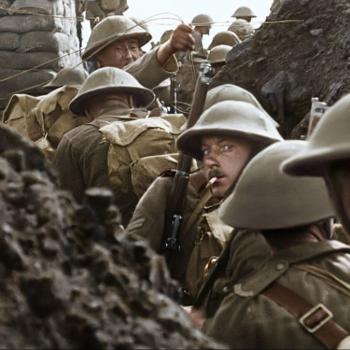At Coalition for Fog, a few commentators have actually defended the U.S. use of atomic weapons on Hiroshima and Nagasaki during World War II. Despite the fact that the use of these weapons is perhaps the greatest sin committed by the United States and that Catholic support or defense of their use is a self-refuting idea, we still find Catholics claiming that these weapons of mass destruction saved lives purchased at the cost of a lesser evil. This is perhaps one of the most irrational and logically unsound arguments that can be devised by anyone who claims to begin from Catholic moral standards as first principles. It never ceases to amaze me that Catholics, despite the unequivocal condemnation of utilitarian ethics by pope after pope, continue to suspend their faith and reason and appeal to such consequentialist assertion, that is, arguing that the end (end of war with Japan) justifies the means (the use of weapons of mass destruction killing almost 200,000 people, mostly civilians, and the poisoning of thousands more). When we defend acts of war before we defend the right to life of innocent civilians, then we have closed our eyes to Christ.
I post here in full one of many statements of John Paul II, who characterized the bombings of Hiroshima and Nagasaki as “crimes committed against civilian populations,” on this specific issue. His judgment, based on undeniable Catholc moral principles, is irrefutable from the Catholic standpoint. There is no room for disagreement here: no Catholic can justify on moral grounds the use of atomic weapons on Hiroshima and Nagasaki.
To speak of Hiroshima and of Nagasaki is to become vividly aware of the immense pain and horror and death that human beings are capable of inflicting upon one another. But it is also to be conscious of the fact that such a tragic destiny is not inevitable. It can and must be avoided. Our world needs to regain confidence in its capacity to choose moral good over evil.
The Catholic Church is irrevocably committed to the challenge of promoting genuine peace between peoples and nations, against war and death. The Church sees this challenge as a duty before God, the Lord of Life, and as inexorable service of love towards every man, woman and child on this earth.
I wish to take this opportunity to repeat something which I believe requires much thought. The vast majority of people want peace. Yet “the contemporary world is, as it were, imprisoned in a web of tensions . . . Humanity’s helplessness to resolve the existing tensions reveals that the obstacles, and likewise the hopes, come from something deeper than the systems (on which modern life and international relations are built). It is my deep conviction . . . and is, I hope, the intuition of many men and women of good will, that war has its origins in the human heart. It is man who kills and not his sword, or in our day, his missiles” (IOANNIS PAULI PP. II Nuntius scripto datus ob diem ad pacem fovendam Calendiis Iannuariis a. 1984 celebrandam, 1, 2, die 8 dec. 1983: Insegnamenti di Giovanni Paolo II, VI, 2 (1983) 1279. 1280) .
It is therefore the human “heart” that must change: from a new heart, peace is born.
In this perspective Hiroshima, from August 6, 1945, and Nagasaki from three days later, have a unique responsibility before the world. The people of these two cities can proclaim, with the force of their own experience, the value of life over death, of peace over war.
Hiroshima is a living witness to what can happen but need not and should never happen. When I visited Hiroshima in 1981 I wished to emphasize that “one must affirm and reaffirm, again and again, that the waging of war is not inevitable or unchangeable”.
Certainly it is not enough to say this, as if peace could be achieved through the repetition of slogans. What is needed is a serious and comprehensive education for peace, and a committed response to the inequalities and injustices rampant in our world. If each individual, group and nation is willing, honestly and sincerely, to follow this path, there will never be another Hiroshima.
The sad experience of forty years ago must be seen as the cornerstone of a new and universally accepted policy of just and peaceful ways to resolve present and future conflicts. Hiroshima’s special role in this process of education for peace is to teach that out of past horror a new outlook and a new hope can be born.
With God’s help Hiroshima’s experience of forty years ago will not be in vain. Each day I pray to the Creator that he may teach us to be effective instruments of peace and fraternal solidarity.
John Paul II, Radio Message to the People of Japan (8/6/85)












